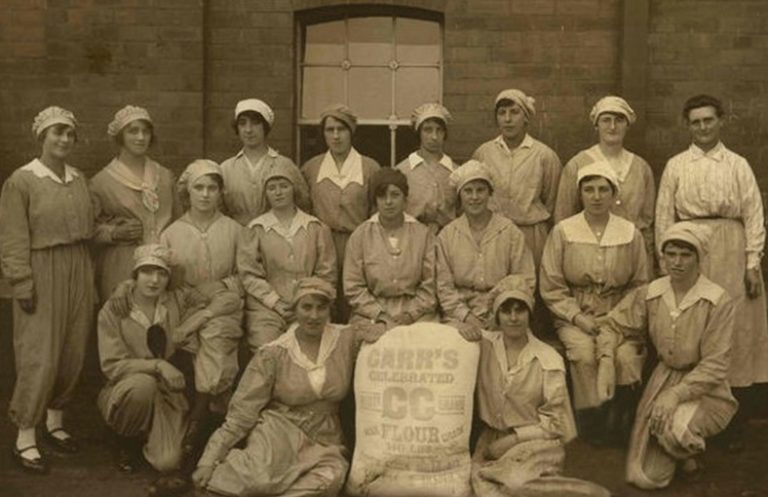This curated reading list outlines the stories of some key women in milling. To access our library listings or online biographies of individual women, simply click on the respective headings.
All of the books mentioned are in our library. To book an appointment to use these volumes, email our Information and Engagement Manager at rachel.riddell@millsarchive.org.

Library Books:
Huddersfield Mill Memories, Vivien Teasdale, Wharncliffe Books, 2006.
This volume presents a documented oral history that reflects the experiences of individuals in the textile sector, both workers and managers, in Huddersfield. It explores the lives of those employed in this vital industry in the old West Riding, spanning from the era preceding World War II to the decline of Huddersfield’s significant mills. Composed of numerous interviews with textile workers, the book provides a deeper understanding of the various roles in the industry. Furthermore, it includes a glossary of textile-related terms and an index, adding to its utility as a tool for comprehending this crucial aspect of Huddersfield’s historical narrative.
The Maid of the Mill: Louie Jermy of Poppyland and Her Times, 1864-1934, Gwen M. Parry, Gwen M. Parry, 1936.
This book serves two purposes: it honors a well-known local figure, Louie Jermy, who lived a productive life for seventy years in the small fishing village of Beckhythe (now Overstrand), and it depicts the village as she knew it, along with its notable residents. While some nostalgically recall Beckhythe’s serene, simpler days before it gained fame as “The Village of Millionaires” and “Poppyland,” a term coined by a London journalist, Overstrand remains a delightful and healthy place. However, its original charm was in its undisturbed tranquility. Jermy’s legacy, albeit unintended, includes the village’s transformation and its growth in popularity, bringing both prosperity and regret to those who cherish undisturbed natural spaces. The creation of this book, enriched with facts and photos gathered by Miss Mabel Glendenning of Norwich, who knew Jermy well, also acknowledges her and Mr. C. W. Barritt’s efforts in memorializing Jermy with two seats on Cromer Road.
The Floss on the Mill: The Re-Awakening of a Watermill, Desna Greenhow, The Hobnob Press, 2004.
This book details the revival of a watermill. Otterton Mill in East Devon, dormant since the 1950s, was revived by Desna Greenhow, who moved into the nearby Mill House. Over 25 years, she not only restored the mill but also turned it into a centre for arts, crafts, natural foods, and entertainment. It chronicles the challenges, experiences, and triumphs involved in restoring a watermill, interweaving historical and personal perspectives. This book provides valuable insights into historical preservation and the personal journey of reawakening a significant piece of local history.
Online Biographies:
A selection of biographies on key women in the milling industry (including millwrights and those involved in its milling (& archival) preservation):
- Amy B Smith (b 1962)
- Betty Sullivan (1902-1999)
- Dr E Cora Hind (1861-1942)
- E M Gardner (d. 1959)
- Eva Ekeblad (1724-1786)
- Evelyn ‘Eve’ Logan (1950-2000)
- Hannah Wilkinson Slater (1774-1812)
- Helen Major (1927–2013)
- Hettie Jones
- Margaret E Knight (1838-1914)
- Maria Christina Bruhn (1732-1808)
- Maria Telkes (1900–1995)
- Mildred Cookson
- Robin and Simpkin: millers and thieves in the Canterbury Tales
- Sybilla Righton Masters (c 1676 -1720)
- Tabitha Babbitt (1779-1853)
